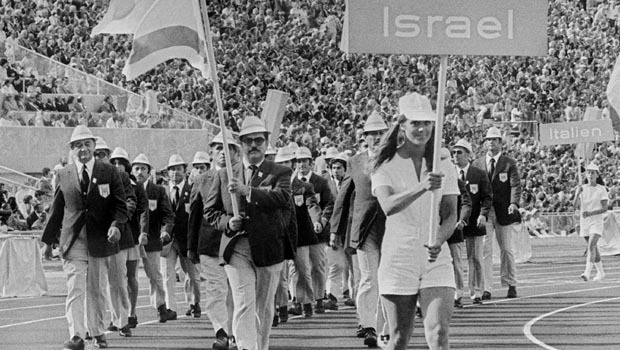IN THE MEDIA
Shameful rejection betrays the Olympic ideal
August 10, 2012 | Sharyn Mittelman

Sharyn Mittelman
Canberra Times – August 10, 2012
The London Olympic opening ceremony should have commemorated the 40th anniversary of the murder of 11 Israeli Olympic athletes, killed by the Palestinian terrorist group ”Black September” at the 1972 Munich Olympics. Shamefully it did not. An official Olympic commemoration was rejected despite a global petition to hold a minute’s silence at the opening ceremony to remember the Munich victims, a campaign supported by world leaders including Prime Minister Gillard and Opposition Leader Tony Abbott, and numerous national parliaments, including Australia’s.
Instead, Israel’s Olympic Committee hosted a memorial at London’s Guildhall to honour their memory on August 6. The memorial was unprecedented in size and participation, with more than 700 people attending including British Prime Minister David Cameron, Germany’s Foreign Minister Guido Westerwelle, Israeli officials and messages of support were read from US President Barack Obama and Prince Charles.
Cameron made a powerful speech and implored the world to ”stop and remember” the ”truly shocking act of evil”. Cameron said the Munich killings were ”a crime against the Jewish people. A crime against humanity. A crime the world must never forget.” He said that it was a ”sickening act of terrorism that betrayed everything the Olympic movement stands for” and that Londoners understood the tragedy of terrorism following the July 7 London bombings. Cameron also reinforced that, ”Britain will always be a staunch friend of Israel” and that the two countries ”share the determination to fight terrorism.”
The main obstacle to the ”minute’s silence” campaign came from International Olympic Committee president Jacques Rogge, who also attended the memorial and uncomfortably listened to speeches in which he was heavily criticised.
The strongest criticism came from two widows of the Munich victims, Ankie Spitzer and Ilana Romano, who have tried unsuccessfully for forty years to persuade the IOC to organise an official commemoration.
In Spitzer’s speech she said, ”Shame on you IOC, because you have forgotten 11 members of the Olympic Family … You’re discriminating against them only because they are Israelis and Jews. We will come back until we hear the words you need to say because you owe them … Those who forget history are bound to repeat it.”
Spitzer also accused the IOC of misplaced priorities, and said, ”Sometimes I wonder if I am the last person left who believes in the Olympic ideals. Is the IOC only interested in power, money and politics … did they forget they are supposed to promote peace, brotherhood and fair play?”
Romano echoed Spitzer’s sentiments and said, ”They were killed on Olympic soil and the appropriate place to remember them is at the opening ceremony.” Romano also accused the IOC of pursuing ”a path of ignorance and denial” and Rogge of personally ”hurting and insulting” them.
The IOC claimed that they would not hold a minute’s silence at the opening ceremony because it was political statement, and because that it would undermine the joy of the opening ceremony. Rogge had explained, ”We feel that the Opening Ceremony is an atmosphere that is not conducive to remembering such a tragic incident.” However, such explanations appear to be a convenient cover for more cynical motives.
If avoiding mention of ”tragic incidents” was such a priority, why did the opening ceremony include a moving five-minute tribute to the 52 people who were killed in the suicide bombings in the London in 2005? While the dedication was fitting, appropriate and in keeping with Olympic traditions, the IOC’s excuse for not extending the same basic honour to the victims of Munich, athletes murdered at the Olympic Games in a terrorist attack in the Olympic village, does not withstand the most basic scrutiny.
Nor would a tribute be unprecedented, as there is an historical record of Olympic ceremonies paying tribute to victims of political events. In the opening ceremony for the 2002 Winter Games at Salt Lake City a tribute was made for the September 11 terrorist attacks and at the 1994 Lillehammer Winter Games a moment of silence was held ”in memory of the city of Sarajevo”. Further at the 2010 Winter Olympics in Vancouver a minute’s silence was held at the opening ceremony to honour Georgian Nodar Kumaritashvili, an athlete killed in a training accident. Therefore, it seems obvious that the real reason they the Munich victims were not remembered in the opening ceremony was because they were Israeli.
The IOC may have been concerned that if there was a minute’s silence wealthy Arab donors that help fund the organisation would object, possibly even quit the Olympics. However, by giving in to their objections – shamefully deciding that some athletes’ blood is worth more than others because of politics – they have utterly betrayed the Olympic ideal, which is supposed to be about our shared humanity. In doing so they have undermined not only the memory of the Munich victims but the Olympic Games themselves.
Sharyn Mittelman is a policy analyst at the Australia/Israel & Jewish Affairs Council.
Tags: Israel





